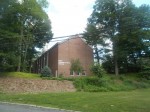Affordable Housing Discussions Alarm Chappaqua Church Neighbors

Internal discussions by representatives of Chappaqua’s First Congregational Church about selling a portion of church property for the construction of affordable senior housing has prompted nearby residents to organize in hopes of seeking alternative uses.
Jon Aram, president of the recently formed First Chappaqua Neighbors Association, said the residents on Orchard Ridge Road, Lawrence Farms East and several other neighboring streets, learned in late April that the church is considering the sale of about five of its seven-and-a-half acres to Carmel-based developer Kearney Realty & Development to build up to 50 units on the site.
Aram said that the group, which has hired an attorney, hopes to work with church leaders because the housing plan would be too dense and out of character with the half-acre residential neighborhood.
“Our goal is to build awareness to share information with our neighbors and to develop a constructive way to work with the church on this land use,” Aram told The Examiner who spoke on behalf of the group.
Aram, who lives directly across the street from the church, said residents have been concerned that the church has failed to include neighboring homeowners in their deliberations.
Rev. Martha Jacobs said given that the church’s trustees and the congregation are still having discussions whether to pursue the sale and development plan and that there has been no application submitted to the town it would be premature to do the level of outreach the neighbors have requested.
If there is a submission, the plan would be extensively reviewed by the town and various agencies, which is the appropriate time for discussions with the larger community to be held, she said.
“Since everything is very preliminary we felt it would be jumping the gun,” said Jacobs, who compared the congregation’s current discussions to a family that is still undecided on a major decision.
She said a decision could be made within the next few weeks.
Jacobs said the church, which has been in existence for more than a century, has been considering the affordable housing plan because it would fulfill its mission of serving the community while infusing its coffers with a source of income that would help the congregation remain financially stable. She said the congregation’s finances are not in dire condition but many houses of worship have felt the pressure of declining attendance and membership.
Preliminary plans call for mostly one-bedroom units built in the northeastern corner of the property that wouldn’t be seen from most residences. It would also be restricted to residents 55 years old and up, Jacobs said.
In a letter to neighboring homeowners on May 8, Jacobs explained that the congregation wanted to decide whether or not it should move forward first.
“We just started the conversation with our own Congregation,” Jacobs wrote. Last Sunday we had our first meeting with the Congregation to solicit their thoughts. We owe it to our Congregation to first inform them of our thoughts and hear their reaction before opening up the dialog to the community.”
New Castle Supervisor Robert Greenstein and other town officials declined to comment on the issue because there has been no formal submission to the town.
But Aram said that many of the neighbors have made a significant investment in their homes. They have also been supportive of the church by buying their Christmas trees and patronizing the annual barn sale, among other functions.
He said the residents want to work constructively to help the church develop additional programs, explore marketing strategies and consider alternative land uses that would bolster the church’s revenue without impacting the neighborhood and burdening the surrounding infrastructure.
“Focusing on a short-term transaction that could temporarily solve that challenge at the risk of dividing the church from its neighborhood doesn’t seem like the right approach,” Aram said.

Martin has more than 30 years experience covering local news in Westchester and Putnam counties, including a frequent focus on zoning and planning issues. He has been editor-in-chief of The Examiner since its inception in 2007. Read more from Martin’s editor-author bio here. Read Martin’s archived work here: https://www.theexaminernews.com/author/martin-wilbur2007/
